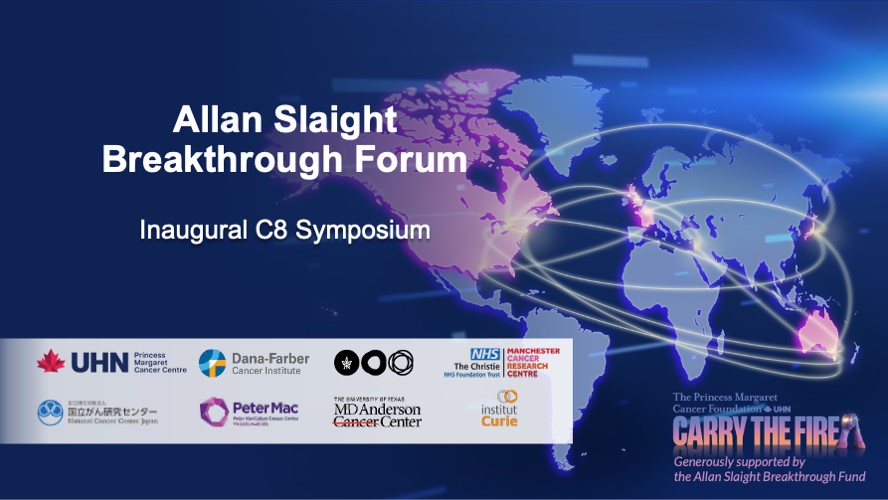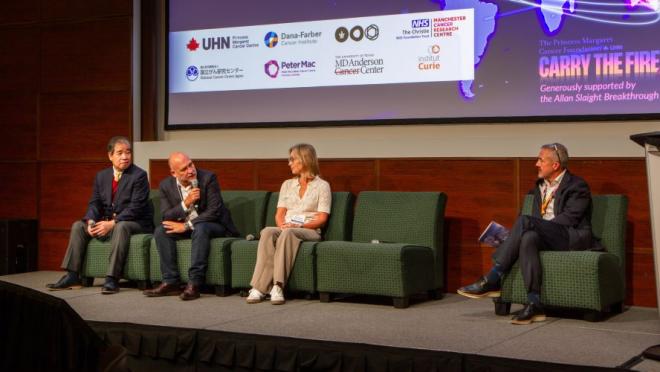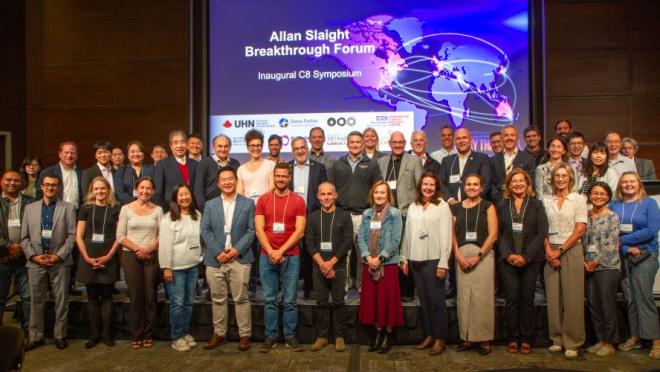
Hosted by UHN’s Princess Margaret Cancer Centre (PM), the Allan Slaight Breakthrough Forum marked the first-ever C8 Symposium, uniting top cancer researchers from eight premier global cancer research institutes.
Held on September 15 and 16, 2025, at the MaRS Auditorium in Toronto, the C8 Symposium brought together leading scientists from cancer research institutions across Canada, Australia, France, Israel, Japan, the UK, and the USA. The event was made possible by the generous support of La Fondation Emmanuelle Gattuso and The Slaight Family Foundation through the Allan Slaight Breakthrough Fund.
The two-day symposium featured over 30 expert talks, moderated discussions, poster presentations, and networking sessions focused on cutting-edge topics such as chemotherapy resistance, synthetic lethality—a treatment approach that targets specific lethal mutations in cancer cells, novel therapeutic targets, and tumour microenvironment dynamics.
The sessions were led by internationally renowned researchers including Drs. Aaron Schimmer and Brad Wouters (PM), Dr. Ricky Johnstone (Peter MacCallum Cancer Centre), Dr. Robert Bristow (Manchester Cancer Research Centre), Dr. Kevin Haigis (Dana-Farber Cancer Institute), Dr. Shai Izraeli (Tel Aviv University), Dr. Steven Le Gouill (Institut Curie), and Dr. Wakako Toga (National Cancer Center Japan).
Opening remarks from Dr. Schimmer, Senior Scientist and Director of PM, set the tone for the symposium, emphasizing the importance of global collaboration in tackling the complexity of cancer. Throughout the event, speakers shared insights into newly discovered cancer-driving mechanisms, innovative therapeutic strategies, emerging technologies, and translational research platforms aimed at improving patient outcomes.

(Pictured from left to right) Panel discussion with Dr. Hiroyuki Mano, Dr. Steven Le Gouill, and Dr. Marianne Koritzinsky, moderated by Dr. Brad Wouters.
A highlight of the symposium was a panel discussion on accelerating cancer target discovery and drug development, inspired by Dr. Hiroyuki Mano’s (National Cancer Center, Japan) presentation on a novel model that has transformed cancer drug discovery. The session featured Dr. Marianne Koritzinsky (PM), who introduced a promising new protein target for cancer, and Dr. Le Gouill, who shared insights into targeted therapy in Mantle Cell Lymphoma, emphasizing biology-driven treatment design.
“We are excited about the potential of collaborating at the institutional level to tackle the biggest problems and biggest opportunities in cancer,” said Dr. Wouters, PM Senior Scientist and Executive Vice President of Science and Research at UHN. “By aligning our institutional strengths, we can create environments that foster innovation, streamline discovery, and deliver impact at scale.”
The symposium also featured a poster session designed to spotlight the work of postdoctoral and emerging researchers, providing a valuable platform for the next generation of cancer scientists to showcase their research to an international audience.
The symposium concluded with a Leadership Summit focused on strategic planning for future C8 initiatives, including mentorship, capacity-building, and global alignment of comprehensive cancer centres. Discussions led by institutional leaders explored ways to support the cancer research workforce and foster international team science.
“This inaugural C8 Symposium marks a pivotal moment in global cancer collaboration,” said Dr. Schimmer. “By bringing together diverse expertise and perspectives, we are laying the foundation for transformative research that will shape the future of cancer care.”

Participants from the Allan Slaight Breakthrough Forum: Inaugural C8 Symposium




